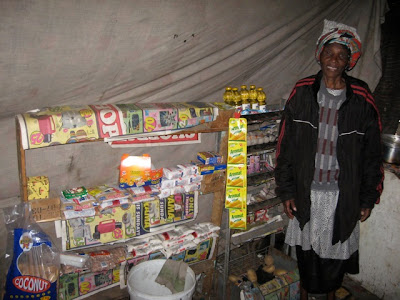In my tour of the U.S., many people were very generous in their financial support of Itipini and my work there and I’ll have more to say about that in another post. But I want to tell the story here of one donor in particular, whose name, I must confess, I do not know. Here’s how much he gave me. That’s right, one dollar. That very dollar bill, in fact, pulled out of his jeans pocket, smoothed out, and handed to me on Fifth Avenue in New York City.
That’s right, one dollar. That very dollar bill, in fact, pulled out of his jeans pocket, smoothed out, and handed to me on Fifth Avenue in New York City.
I was strolling down Fifth Avenue, taking in a few of the tourist sights in a brief moment of down-time. As I did so, a young, black man, dressed in all the accoutrements of urban cool - baggy, low-slung jeans, ostentatious jewelry, a cigar in his hand, a do-rag on his head - shoved a CD in my hands and began his sales pitch. He’s raising money for his third (music?) video by selling the CDs and won’t I please just buy one? Sometimes I’m pretty good about extricating myself from situations like this but I found myself drawn in (he complimented me on my shirt, which helped, particularly as it had cost me about $2.37 at Goodwill) and started answering his questions - where am I from? what do I do? So it quickly came out that I live in South Africa and work with people with AIDS and, in fact, was in New York City raising money and awareness for that exact cause.
This gave my new friend a reason to pause, after which he stuffed his hand in his pocket and pulled out the dollar. I did my best to refuse it but he would not take no for answer so I smiled, thanked him, stuffed it in my pocket, and carried on, feeling smugly self-satisfied at my ability to raise money without even trying. I made it about four more blocks, thinking about how I wanted to tell this story on this blog - mostly to show off my fundraising prowess - and decided I needed a picture of my donor to go with the post. So I turned around and headed back and found my friend again. I felt obligated this time to buy a CD (he more than got his dollar back) but I did get my picture - he made me wear his beaded necklace, by the way. And I had a longer conversation with him about his background and his work that makes the memory of this encounter less about my fundraising ability than about the similarities between people all over the world.
And I had a longer conversation with him about his background and his work that makes the memory of this encounter less about my fundraising ability than about the similarities between people all over the world.
It takes all kinds to do God’s work.










































 I think I've mentioned before that Mthatha doesn't have a good bookstore or library so it's BYOB when you live there and like to read, provided, of course, you can figure out a way to fit all those in your suitcase without passing the weight limit.
I think I've mentioned before that Mthatha doesn't have a good bookstore or library so it's BYOB when you live there and like to read, provided, of course, you can figure out a way to fit all those in your suitcase without passing the weight limit.


